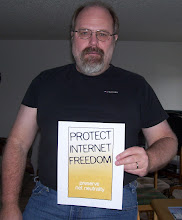 Medical marijuana patient Bruce Olson, left, with attorney Thomas Balerud at the Kitsap County Courthouse, March 24, 2009. Photo by Reality Catcher
Medical marijuana patient Bruce Olson, left, with attorney Thomas Balerud at the Kitsap County Courthouse, March 24, 2009. Photo by Reality CatcherMedical marijuana patients may be a little safer in their homes in Kitsap County, Washington tonight.
Almost two years after his arrest, and after a very expensive prosecution, 55-year-old patient Bruce Olson of Olalla has been acquitted by a jury of all charges stemming from the bust of a hidden marijuana grow-room.
The case has national implications, has received lots of attention and could make a huge difference in future medical marijuana enforcement in Kitsap County and elsewhere in Washington. The importance of the Olson case wasn't lost on local and King County medical marijuana activists, who attended the entire trial en masse to offer their moral support and to silently witness to the trial.
The Back Story In Brief
Back in May of 2007, Olson and his then-estranged wife, Pamela, 51, were both arrested after the WestNET Drug Task Force raided their home and seized 48 immature marijuana plants growing in an underground bunker behind the main structure. Both Olsons had valid, doctor-approved medical marijuana recommendations, which the police found upon searching the house.
Bruce lost his home and now lives in a travel trailer due to legal costs involved in fighting two felony charges brought by the Kitsap County Prosecutor’s Office. “Everything I’ve worked for in my entire life is gone,” said Olson, who suffers from arthritis and other ailments following decades as a stonemason. “But it’s all worth it for the cause: quit arresting medical marijuana patients.”
The prosecution's expensive boondoggle was all for naught; even flying in a "confidential informant," Stephen Kenney, from Oklahoma, didn't help. (Neither did the fact that Kenney, an obvious tweaker who admitted doing hard drugs and alcohol every day for 19 years, is in the running for "most unconvincing prosecution witness in history.")
Ineptitude And Arrogance: Not A Good Combination
Kitsap County Head Prosecutor Russell Hauge handed off the case to Alexis Foster. It must have been a hell of an initiation for Foster, as her first-ever jury trial. Her greenness showed; while her command of the facts showed a certain grim competence, her lack of connection to the jury showed advanced cluelessness.
Here's a couple of hints, Alexis: It did NOT help your case to have a visible smirk on your face every time Judge Leila Mills ruled in your favor. And you really should consider working on another "speaking voice" to use before juries. The one you used in this trial, along with all the unnecessary sarcasm and pissiness with which you imbued it, quickly becomes about as enjoyable as fingernails on a chalkboard.
In American justice, there's only one force in the courtroom more powerful than the judge, and that's the jury. Alexis, you can't act obnoxiously throughout a one-week trial and expect to win over many converts. Nobody likes a jerk.
Oh, and you don't get to pick where medical marijuana patients position their grow-rooms; your attempts to second-guess the Olsons on this point wasn't helpful to your case. Also, your insistence that since Bruce used medical marijuana he should apparently, in your non-medical estimation, suddenly no longer need any other prescription drugs at all, is just laughable.
.......
But, in all fairness, Foster was handed a very hard case to win. At the time of the Olsons' arrest, the exact number of marijuana plants which may be legally grown by patients was undefined, with one WestNET detective testifying before the jury that their "working number" for such grows was 27 plants per patient.
That all changed last July, when, at the direction of the Washington Legislature, the Department of Health released new "presumptive limits" for patients of 15 growing plants and 24 ounces of dried, usable marijuana.
Predictably -- and just as many medical marijuana advocates had feared -- it didn't take long for law enforcement to try to use these presumptive limits, supposedly instituted for the protection of patients, providers, and police, as a weapon against patients. Prosecutor Foster repeatedly and loudly referred to the new 15-plant limit throughout the trial, but the jury wasn't fooled. Bruce Olson's lawyer, Thomas Balerud, was very effective in telling the jury that there were, in effect, NO plant limits in force at the time of the arrests.
Moments To Remember
Anytime you spend a week with a group of fellow activists, as I have during this trial, there are plenty of memorable moments. Here are a few of mine, remembered in no particular order.
 • When Prosecutor Foster attempted to impeach the credibility of defense witness Paul Stanford, an expert on marijuana cultivation who is also CEO of The Hemp and Cannabis Foundation (THCF), she wanted to use Stanford's long history with marijuana against him. Foster asked him "Why did you grow marijuana before it was legal for medical use?" Paul answered quickly, easily, and believably: "Because I like marijuana." Bada-BING!!!
• When Prosecutor Foster attempted to impeach the credibility of defense witness Paul Stanford, an expert on marijuana cultivation who is also CEO of The Hemp and Cannabis Foundation (THCF), she wanted to use Stanford's long history with marijuana against him. Foster asked him "Why did you grow marijuana before it was legal for medical use?" Paul answered quickly, easily, and believably: "Because I like marijuana." Bada-BING!!! • When Prosecutor Foster attempted to impeach Pamela Olson's testimony that she operated the grow-room, the prosecutor implied that Pam wouldn't be able to pick up one of the ballast units used to power marijuana-growing lights. Olson, who is quite a small woman, offered to pick up the ballast in front of the jury -- and did so, to the prosecutor's embarrassment.
• When Prosecutor Foster attempted to impeach Pamela Olson's testimony that she operated the grow-room, the prosecutor implied that Pam wouldn't be able to pick up one of the ballast units used to power marijuana-growing lights. Olson, who is quite a small woman, offered to pick up the ballast in front of the jury -- and did so, to the prosecutor's embarrassment.
• Prosectutor Foster attempted to impeach the credibility of defense witness Dr. Thomas Orvald, an expert in the use of medical marijuana. Foster first asked the doctor about his stated reluctance to prescribe harsh narcotic painkillers to patients, then, thinking she was swooping in for the kill, asked him, "Why do you recommend marijuana if you are against narcotics?" To which the good Doctor quickly and correctly answered, "Because marijuana is not a narcotic."
 • Immediately after the trial, defense attorney Balerud told reporters: “In this case, the jury spoke its mind and determined that no lawyers should be able to overrule a doctor’s judgment.” That is indeed the bottom line. Why, when it comes to marijuana, do law enforcement types immediately become medical "experts"? And why aren't the detectives of WestNET able to let go of their irrational hatred of marijuana and the people who use it, now that medical marijuana's been legal in Washington for ELEVEN YEARS?
• Immediately after the trial, defense attorney Balerud told reporters: “In this case, the jury spoke its mind and determined that no lawyers should be able to overrule a doctor’s judgment.” That is indeed the bottom line. Why, when it comes to marijuana, do law enforcement types immediately become medical "experts"? And why aren't the detectives of WestNET able to let go of their irrational hatred of marijuana and the people who use it, now that medical marijuana's been legal in Washington for ELEVEN YEARS? Special thanks to my good friend Phil Mocek for generously sharing his excellent trial notes with Reality Catcher.
Special thanks to my good friend Phil Mocek for generously sharing his excellent trial notes with Reality Catcher.






























No comments:
Post a Comment